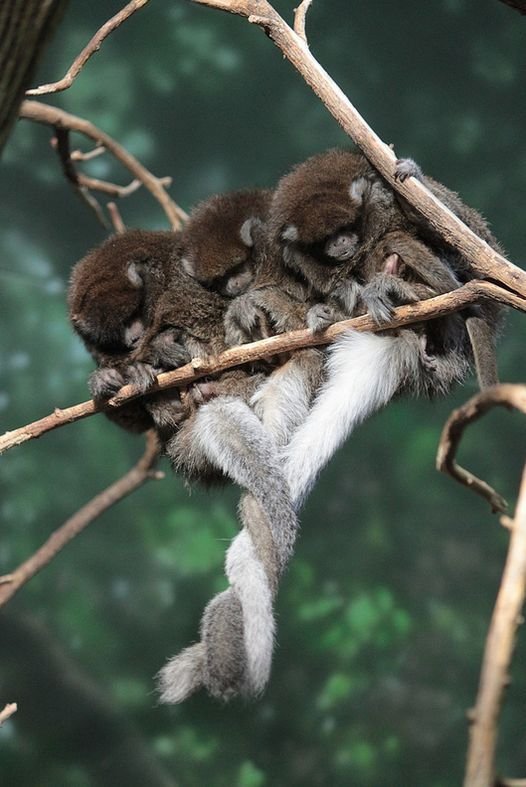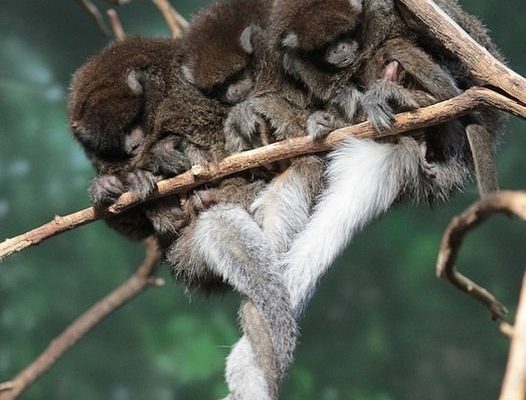
You might be wondering what makes Titi monkeys stand out in the animal kingdom when it comes to parenting. For starters, they are known for their strong family dynamics and emotional connections. Unlike many other species, these monkeys display a high level of parental investment, which is fascinating to observe. So, let’s dive into the wonderful world of Titi monkeys and explore how they nurture their young in the wild.
The Titi Monkey Family Structure
Titi monkeys live in small family groups that typically consist of a monogamous pair and their offspring. This tight-knit structure is essential for raising young monkeys effectively. The family unit functions like a well-oiled machine; both parents share the responsibilities of caring for their little ones.
Here’s the thing: Titi monkeys form strong emotional bonds, not just between mates but also with their babies. These relationships help in developing social skills and emotional intelligence in the young. Just like we learn from our families, Titi monkeys pick up behaviors from their parents, ensuring the survival of their species. The whole family gets involved in teaching the young ones essential skills, like foraging for food and navigating their forest home.
Gestation and Birth of Titi Monkeys
When it comes to raising their young, the journey starts long before the baby arrives. Titi monkeys have a gestation period of around 150–160 days. During this time, the mother becomes increasingly protective and selective about her surroundings. You can think of it like a pregnant woman preparing her home for a baby—everything needs to be just right.
When a baby Titi monkey is born, the mother immediately cradles it close to her body, keeping it warm and safe. Birth in the wild can be a dangerous time, so having both parents nearby helps add an extra layer of protection. The father is often seen helping out by staying close to the mother and occasionally bringing her food while she focuses on nursing. It’s a beautiful display of teamwork that ensures their little one gets the best start in life.
Nurturing and Feeding Their Young
Once the baby Titi monkey arrives, nurturing becomes a full-time job for both parents. They rely heavily on a close bond, with the mother taking on the primary role in nursing and caring for the baby. Initially, the baby clings to its mother, who provides not only food but also a sense of security. This close physical contact is crucial for the baby’s development, as it helps build trust and strengthens their bond.
Feeding time is quite interesting too. Titi monkeys are primarily frugivorous, meaning they eat a lot of fruits, leaves, and flowers. As the baby grows, the parents gradually introduce solid food—this process is like teaching a child about healthy eating habits. You can picture them gently guiding the little one to taste a piece of fruit. As they share food, they reinforce social bonds and teach their young what’s safe and nutritious.
Social Play and Learning
Playtime is where Titi monkeys really shine. Young monkeys learn a lot through play, which includes climbing, jumping, and even mock fighting. It might look like chaos at times, but this playful behavior is crucial for developing motor skills and confidence. Watching them frolic in the trees is a reminder of how important play is for both animals and humans alike.
Here’s the thing: through play, young Titi monkeys learn essential survival skills. They practice how to navigate their environment, escape from potential threats, and interact with their peers. This active engagement prepares them for adult life. Just as kids learn to solve problems through play, Titi monkeys also become adept at finding food and socializing with the rest of the group.
The Role of Community in Raising Young
Though the primary caregiving roles fall on the parents, Titi monkeys live in small family groups that expand the support system for the young ones. This communal aspect helps reinforce the learning process. Other family members, including siblings and older relatives, often step in to help care for the infant.
This community support is essential; it allows the parents to take breaks and ensures that the baby receives extra attention and care. From a broader perspective, living in a tight-knit group offers important lessons about cooperation, sharing, and social dynamics. Just like we thrive in communities, so do these monkeys.
Challenges of Raising Young in the Wild
Of course, raising young ones in the wild isn’t without its challenges. Titi monkeys must constantly be vigilant for predators, such as hawks and snakes, which pose a threat to the young. Imagine being a parent in the wild; it’s essential to be aware of your surroundings and protect your family at all costs.
Another challenge they face is food availability, especially during seasonal changes. When fruits are scarce, it can make nourishing their young tricky. The parents must be resourceful and innovative in finding food sources, often moving to different areas to ensure their babies are well-fed. It’s a constant balancing act, but Titi monkeys are remarkably resilient, adapting to their environment as best they can.
Titi monkeys provide a wonderful example of parental care in the animal kingdom. Their cooperative approach to raising young demonstrates the importance of strong family bonds and community support. Every aspect of their parenting, from pregnancy to playtime, is geared towards ensuring the survival and emotional well-being of their offspring.
As we reflect on the nurturing behavior of Titi monkeys, it reminds us of the importance of community in raising the next generation, whether in the animal world or our own. The lessons of love, teamwork, and resilience they teach are universal, showcasing that parenting, in any form, is a shared journey filled with challenges and joys.

